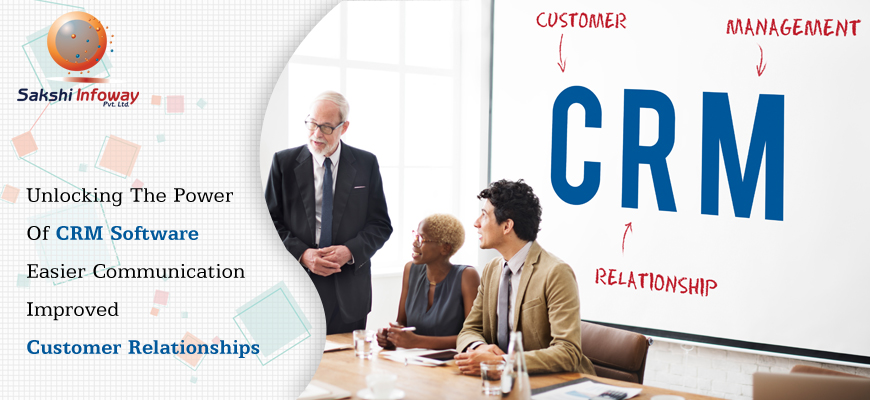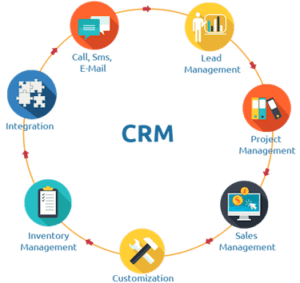Unlocking The Power Of CRM Software: Easier Communication & Improved Customer Relationships

Customer relationships are the backbone of any successful business, so it’s essential to maintain them and keep them strong. To help make this process easier, many businesses are now turning to CRM software as a way to streamline their customer communications and improve their overall customer relationships. In this article, find out how you can unlock the power of CRM software for your business and start enjoying the benefits of easier communication and improved customer relationships.
Introduction to CRM Software
If you’re like most small business owners, you wear a lot of hats. You’re the CEO, CFO, and possibly even the IT manager. So, when it comes to choosing and managing customer relationship management (CRM) software, it can be difficult to know where to start.
CRM software is designed to help businesses manage their customer relationships more effectively. It can be used to track customer interactions, sales, and support requests. CRM software can also be used to create marketing campaigns and track their effectiveness.
The benefits of using CRM software are numerous. With CRM software, you can have all of your customer interactions in one place. This makes it easier to track sales and support requests. Additionally, CRM software can help you better understand your customers so that you can provide them with the best possible service.
If you’re thinking about implementing CRM software in your business, there are a few things to keep in mind. First, you’ll need to decide which features are most important to your business. There are a variety of CRM software packages available on the market, so it’s important to choose one that meets your specific needs. Second, you’ll need to train your employees on how to use the software. This is essential for getting the most out of your investment. Finally, you should consider integrating your CRM software with other business applications such as accounting
What is CRM Software?
CRM software is a type of customer relationship management tool that helps businesses manage and track their customer interactions. It can be used to store customer contact information, track customer communications, and manage customer relationships. CRM software can help businesses improve their customer service, sales, and marketing efforts.
How can CRM Software Help Improve Customer Relationships?
CRM software can help improve customer relationships in a number of ways. First, it can help businesses keep track of their customers’ contact information and communication history. This way, businesses can easily follow up with customers and address any concerns they may have. Additionally, CRM software can automate tasks such as appointment reminders and customer satisfaction surveys. This allows businesses to spend more time developing relationships with their customers rather than managing administrative tasks. Finally, CRM software provides valuable insights into customer behavior. This data can be used to identify trends and make decisions that will improve the overall customer experience. When used effectively, CRM software can be a powerful tool for building strong customer relationships.
Benefits of Using CRM Software for Easier Communication
The main benefit of using CRM software is that it facilitates communication between company and customer. By tracking customer interactions and storing them in a central database, CRM software makes it easy for companies to keep track of customer needs and preferences. This information can be used to improve customer relationships by providing better customer service and targeted marketing. Additionally, CRM software can help companies manage their sales processes more effectively and efficiently, leading to increased sales and profitability.

What Types of Customers Can Benefit from Using a CRM System?
There are many different types of customers who can benefit from using a CRM system. Businesses that have a large customer base or that rely heavily on customer interactions can use a CRM system to manage their customer data and improve communication with customers. A CRM system can also be beneficial for businesses that have a sales team, as it can help to track customer interactions and sales data. Additionally, businesses that provide customer support can use a CRM system to keep track of customer inquiries and issues. Ultimately, any business that wants to improve its communication with customers and better manage its customer data can benefit from using a CRM system.
Features of a Good CRM System
A good CRM system should offer a variety of features that can help businesses improve communication and customer relationships. Some essential features to look for in a CRM system include:
1. Contact management: A good CRM system should provide a central database where all customer contact information can be stored and accessed. This will allow businesses to easily keep track of customer communications and follow up on any outstanding issues.
2. Lead tracking: A good CRM system should offer lead tracking capabilities so businesses can see which marketing campaigns are generating the most leads and sales. This information can be used to fine-tune future marketing efforts.
3. Opportunity management: A good CRM system should offer tools for managing sales opportunities so businesses can see which deals are most likely to close and prioritize their time accordingly.
4. Reporting and analytics: A good CRM system should offer reporting and analytics features so businesses can track key metrics such as customer engagement, conversion rates, and more. This information can be used to improve overall performance.
5. Automation: A good CRM system should offer automation features so businesses can streamline their processes and save time. This includes the ability to automate tasks such as customer segmentation, follow-up emails, and more.
6. Integration: A good CRM system should be able to integrate with other business systems, such as accounting software, marketing automation tools, and more. This will allow businesses to get a better view of their customer relationships and data across all departments.
7. Customization: A good CRM system should offer a wide range of customization options so businesses can tailor the platform to their specific needs and preferences. This includes features such as custom fields, workflow automation, and more.
Steps to Implement and Use a CRM System
The first step to using a CRM system is understanding what it is and how it can help your business. A CRM system is a software solution that helps businesses manage their customer data and interactions in one central place. This can include contact information, communication history, sales data, and more. Having all of this information in one place makes it easy for businesses to track their relationships with customers and better understand their needs.
The next step is choosing the right CRM system for your business. There are many different options on the market, so it’s important to do your research and find one that will fit your specific needs. Once you’ve chosen a system, the next step is to implement it into your business. This can be done by working with a CRM consultant or company that specializes in setting up these systems. They will be able to help you get the most out of your new CRM system.
Once you have your new CRM system up and running, the final step is to start using it! Begin tracking your customer data and interactions, and see how it can help improve your overall customer relationships. You may also want to train employees on how to use the system so they can get the most out of it as well. With a little bit of effort, you can unlock the power of CRM software and take your business to the next level!
Tips for Successfully Utilizing a CRM System
In order to get the most out of your CRM system, it is important to keep the following tips in mind:
1. Keep your data clean and up-to-date – This will help you avoid having to deal with duplicate or inaccurate information down the line.
2. Use automation where possible – Automating repetitive tasks will free up time for you and your team to focus on more important things.
3. Foster a culture of collaboration – Encourage your team to use the CRM system as a tool for collaboration and communication.
4. Take advantage of reporting and analytics – Use the data in your CRM system to generate reports and insights that can help you improve your business.
Conclusion
CRM software is an incredibly powerful tool that can help businesses build better customer relationships. By understanding how to use CRM software and its various features, you can take your business to the next level by improving communication with customers and unlocking the potential of increased sales opportunities. With improved customer satisfaction levels and more accurate data analysis, a well-implemented CRM system can be a great asset for your business.


Comments
Post a Comment